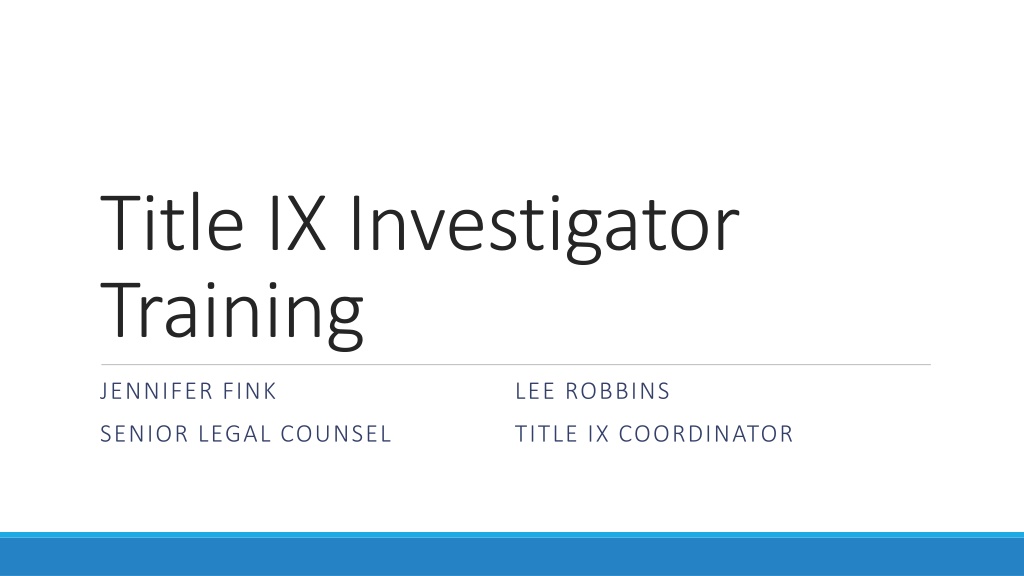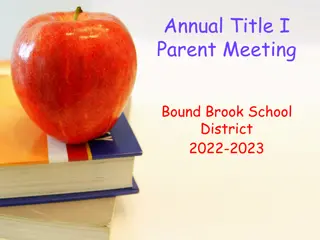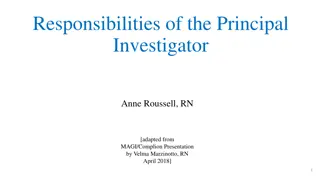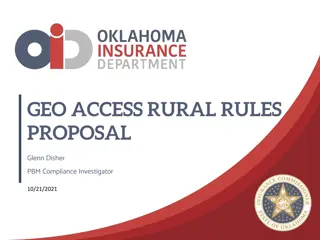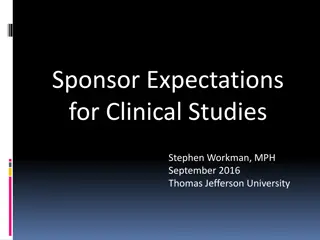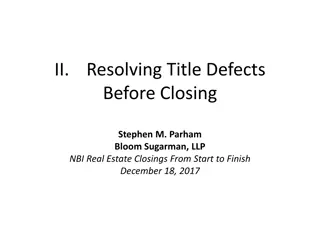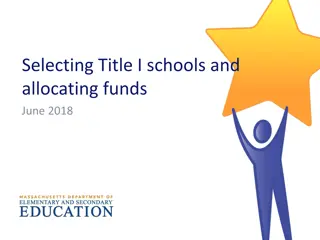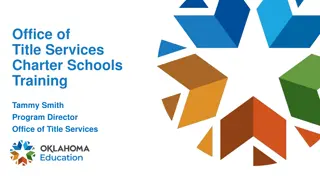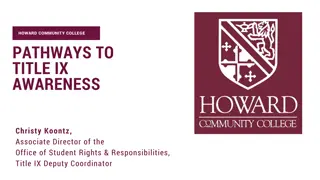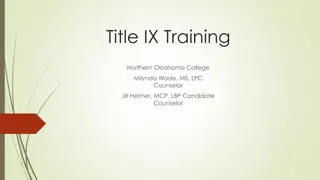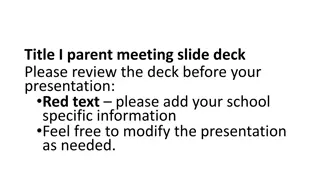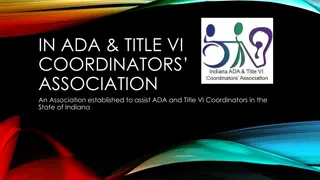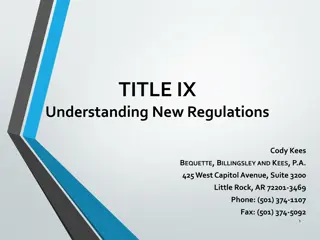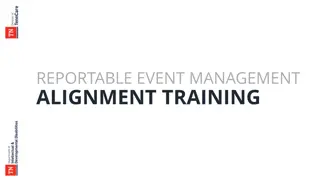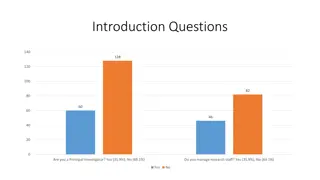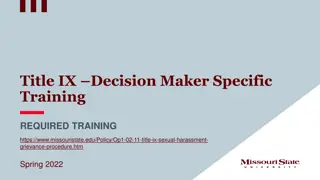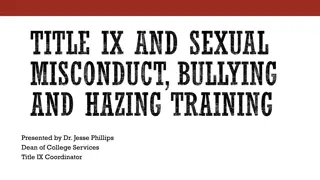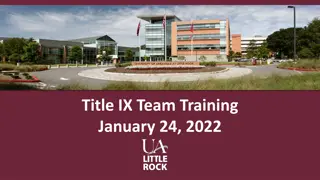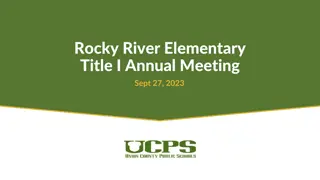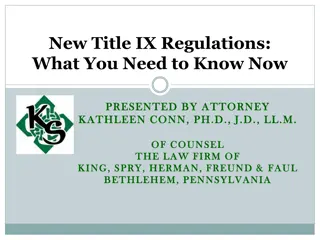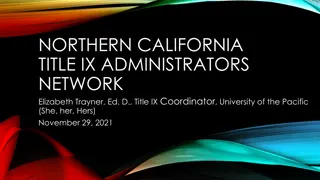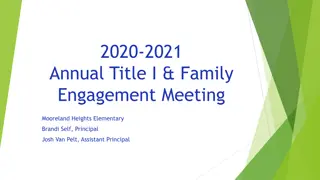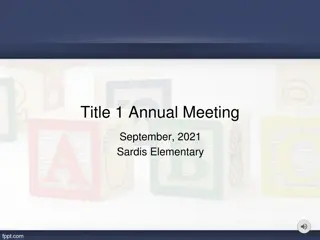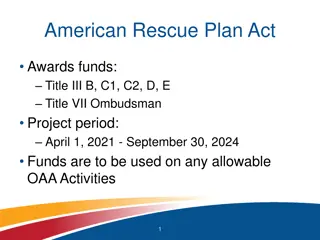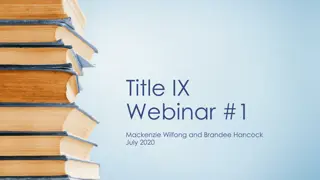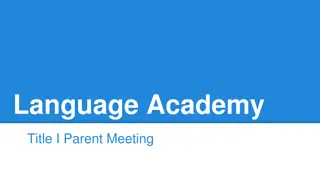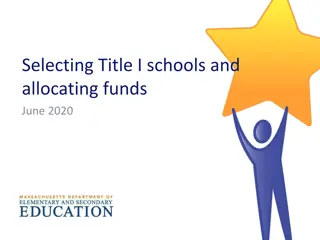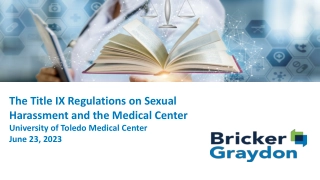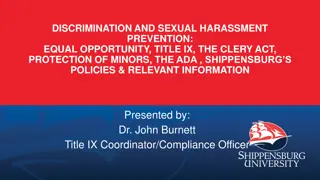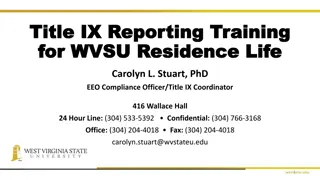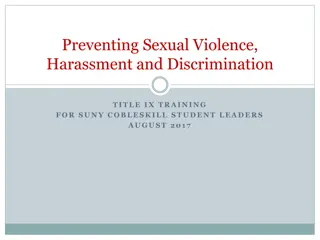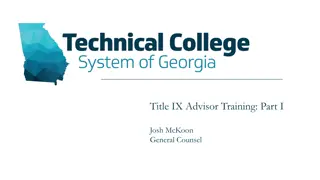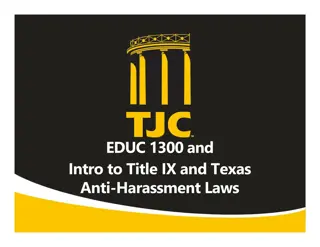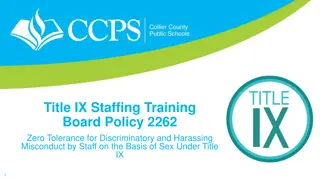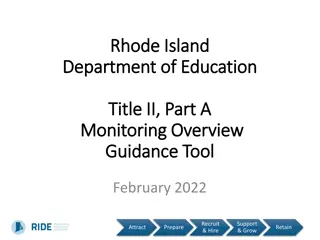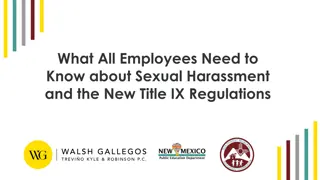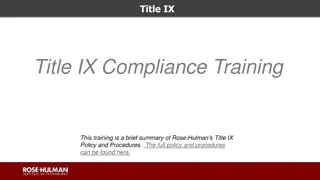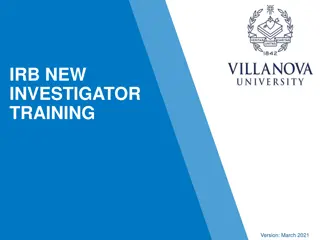Title IX Investigator Training Overview
The training covers Title IX regulations, informal resolution, investigations, jurisdictional thresholds, and the grievance process. It outlines actionable sexual harassment criteria, the three-part framework, and Title IX sexual harassment definitions. Participants also learn about jurisdictional requirements in educational programs. The session emphasizes compliance with new regulations, including specific policy language and record-keeping mandates.
Download Presentation

Please find below an Image/Link to download the presentation.
The content on the website is provided AS IS for your information and personal use only. It may not be sold, licensed, or shared on other websites without obtaining consent from the author. Download presentation by click this link. If you encounter any issues during the download, it is possible that the publisher has removed the file from their server.
E N D
Presentation Transcript
Title IX Investigator Training JENNIFER FINK LEE ROBBINS SENIOR LEGAL COUNSEL TITLE IX COORDINATOR
Agenda Introduction/Welcome Overview of Title IX Regulations and New TAP/Appendix Informal Resolution Conducting Investigations Overlap with Other University Policies Questions
Introduction and Welcome Introductions What is a Deputy Title IX Coordinator? (Thank you for serving in this role!)
Summary The new regulations address sexual harassment under Title IX and: Set forth a new definition of Title IX Sexual Harassment; Establish a jurisdictional threshold; Identify the conditions that trigger, and set a sufficiency standard for, a school s obligation to respond to reports of Title IX Sexual Harassment; Establish the process for Complainants to initiate a formal grievance process; Delineate the procedural steps involved in the formal grievance process; and Mandate other items such as specific language to be included in a Title IX Policy and training and record keeping requirements.
Three-Part Framework 1. Actionable sexual harassment PLUS 2. Actual knowledge triggers a school s response which 3. Must not be deliberately indifferent
Title IX Sexual Harassment Conduct, on the basis of sex, that satisfies one or more of the following: An employee conditions a benefit, aid, or service on participation in unwanted sexual conduct (Quid pro quo) Unwelcome sexual conduct, determined by a reasonable person, to be so severe, pervasive, and effectively denies equal access to a program or activity Sexual assault, dating violence, domestic violence, and stalking as defined by specific federal statutes andobjectively offensive that it TAP 61
Educational Program or Activity Jurisdictional requirement that the alleged sexual harassment occur in the University s Education Program or Activity Definition of program or activity, including all of the operations of a university, college, or school, is unchanged. Added statement that it includes: Locations, events, or circumstances over which the institution/school exercised substantial control over both the Respondent and the context in which the harassment occurs, and Any building owned or controlled by an officially recognized student organization Title IX is applicable only in the United States TAP 61
Actual Knowledge Actual knowledge means notice of sexual harassment or allegations of sexual harassment to: Title IX Coordinator Any official who has the authority to institute corrective measures Responsible Employees
Grievance Procedures Prompt response in a manner that is not deliberately indifferent and adopt and follow the grievance procedures in the new regulation before any discipline is issued Equitable response, including by offering supportive measures to both Complainants and Requirements Presumption of non-responsibility
Procedural Requirements New Procedural Requirements Include: Formal Complaints; Mandatory and Permissive Dismissals; Investigative reports; Optional informal resolution, if agreed to by both parties; Live hearings if the matter is not resolved through informal resolution; Cross-exam conducted by the Complainant and Respondent s advisors, who may be attorneys, and a requirement that schools provide advisors at the hearing, for the purposes of cross-exam, to parties who don t have an advisor present; A hearing decision-maker, who, among other items 1) must not be the same person as the Title IX Coordinator, 2) must make relevancy determinations, and 3) must make a written determination of responsibility that includes findings of fact, conclusions regarding the application of the Title IX policy to the facts, and a rationale for the result as to each allegation; and Appeals, on three specified grounds, which must be heard by an appeal decision-maker who is separate from the hearing decision-maker.
TAP No. 61 Important Concepts Timeframes Advisors Reports/Formal Complaints Supportive Measures Confidentiality Policy Presumptions Dismissals Consent Standard of Evidence Amnesty Retaliation Privileged Information Removals and Leaves Equitable Treatment Conflicts of Interest/Bias Credibility Objective Evaluation of Evidence/Avoiding Prejudgment of Facts at Issue Relevance
Formal Grievance Process Appendix A Response to a Formal Complaint Role of Deputy Investigations Hearings Appeals
Informal Resolutions Mediation Mediation is a process by which a Mediator helps the parties discuss and try to resolve the Formal Complaint. Each party will separately meet with the Mediator to share information and feelings; discuss his/her understanding of the facts in dispute; describe his/her desired outcome; and explore mutually acceptable ideas for the resolution of the Formal Complaint. After a Formal Complaint of Title IX Sexual Harassment is filed, and at any time prior to reaching a determination regarding Respondent s responsibility, the University offers mediation as an alternative to a full investigation and adjudication of the Formal Complaint. Mediation is facilitated by a Deputy Title IX Coordinator who is not involved in the Formal Grievance Process (the Mediator. ) Parties are not required to participate in mediation. Mediation Process
Conducting Investigations Preparing for the Interview Building Rapport Effective Questioning Gathering/Organizing Evidence Investigative Report
Preparing for the Interview Review all currently available information/evidence Determine what s missing from your understanding Understand the allegations, key facts in dispute, and key facts not in dispute Develop an outline, but follow the conversation trail during the interview
Building Rapport Verbal and non-verbal Think about room set up, posture, tone of voice Ensure privacy Acknowledge when a question is difficult or uncomfortable Overlap with effective questioning
Effective Questioning Start with the five Ws Ask both open-ended and specific questions Actively listen and ask follow up questions Avoid leading questions Understand the difference between facts and opinions I don t know/recall vs. that didn t happen Can ask catch-all questions How to use your question outline Note on consent and capacity to consent questions
Evidence Review of types of evidence Directly-related vs. Relevant
Investigative Report Investigations conclude with an Investigative Report that fairly (by objective evaluation free from bias) summarizes the relevant evidence Investigative Report contents
Overlap with Other University Policies TAP 30, TAP 31, Student Handbook, Others From TAP: Federal regulations require that Title IX Sexual Harassment be defined more narrowly than harassment is defined under other University Policies and civil rights laws. The University, and in some circumstances state and federal law, also prohibits discrimination and harassment beyond that encompassed by the Title IX Sexual Harassment definition, where based on race, color, gender, sex, sexual orientation, pregnancy, age, religion, national origin, marital status, genetic history, Veteran status, disability, and/or any other category or characteristic otherwise protected by state or federal law. See the Student Handbook; TAP No. 30: Affirmative Action, Equal Educational and Employment Opportunity, and Human Relations in the Workplace and Classroom; and TAP No. 31: Sexual Misconduct. As determined by the University, reports or Formal Complaints of conduct that do not meet the definition of Title IX Sexual Harassment and/or that are not under the University s jurisdiction under this Policy may still violate and be addressed in accordance with other University Policies, including TAP 30, TAP 31, and the Student Code of Conduct.
